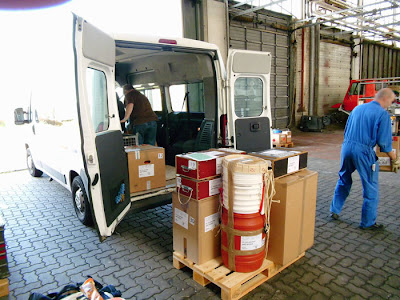21.09.2012-31.10.2012 - Kafka meets Ubu...
(Preparation of the cruise ANT-XXIX/3)
21.09.2012 (Friday). The AWI asks me a fourth printed
and signed version of the forms for the dangeous goods.
24.09.2012 (Monday). I send a second e-mail to World
Courier for the transport of the specimens back to Belgium. The relevant person
is absent until 08.10.2012. However this is not extremely urgent.
28.09.2012 (Friday). The medical service of the AWI
informs that my health situation is considered as acceptable for the mission.
15.10.2012 (Monday). World Courier gives me a more
precise estimation of the price for bringing specimens in alcohol and DNA
extraction products from Punta Arenas to Brussels. I am afraid by the price
(2600 euros). It seems there is no other alternative. I inform Thierry
Backeljau (the head of our department) of the situation. World Courier also
told me that I have to contact the Chilian ministry of fisheries and the
Belgian 'Agence Fédérale pour la Sécurité de la Chaîne Alimentaire A.F.S.C.A.' [Federal Agency for the safety of the Food
Chain A.F.S.C.A.] for import/export autorisations if the specimens have to be exported from Chile.
17.10.2012 (Wednesday). I send an e-mail to the AFSCA
to know if I need an import permit.
18.10.2012 (Thursday). I send an e-mail to the Chilean
ministry of fisheries (SERNAPESCA) to know if I need an export permit. The
AFSCA informs me that the form sent to me by World Courier is outdated. They
sent me the link to the good one. In the afternoon, the SERNAPESCA informs me
that I do not require an export permit from them. On the other hand there are further
complicated red tape problems on the Belgian side for the import of material
(to be treated next week).
23.10.2012 (Tuesday). I do a "Demande
d'autorisation pour l'utilisation des sous-produits animaux pour la
recherche" [Request for authorization for the use of animal by-products for research] by e-mail to the "SPF Santé publique, la
sécurité de la chaîne alimentaire et de l'environnement" [Public
Health, Food Chain Safety and Environment] as requested by the AFSCA on 18.10.2012. If
they don't reply me today or tomorrow I will phone them. I really hope that
this Kafkaesque series of administrative rerquests will come to an end. The 'SPF Santé publique, la sécurité de la chaîne
alimentaire et de l'environnement' asked me to fill a very complicated form. Part
of it has to be filled by Thierry Backeljau (the head of our department).
Thierry is very surprised that we have to fill such complicated documents. He
asked me to contact other colleagues, who have recently transported biological
samples from distant countries. They told me that we could transport such
material by cargo or as extra-suitcases and to have with me an order of mission
signed by the director of RBINS and a document signed by AWI proving that I am
in legal possession of this material. I just have to remove most of the alcohol
from the vials. However I must say that I am more than skeptical, especially
because alcohol is considered as a dangerous good (flammable). A colleague told
me that he brought his specimens in 6 L UN barrels that he put in metal cart,
that he use as travel bagages. He put padlocks with numbers that the custom
officers can open. He put 2 barrels per cart.
29-30-31.10.2012 (Monday-Tuesday-Wednesday). Kafka
meets Ubu, but a solution is dawning. Endless discussion and exchange of
contradictory messages during the whole day (by e-mail and by phone with Gritta
Veit-Köhler (Senckenberg Institute, Frankfurt am Main), World Courier Germany,
World Courier Belgium, and Julian Gutt) concerning the transport of the
samples. No bad will between people (quite the contrary) but a very complex
situation. It now appears that the DNA extraction products and the priority
samples will be sent by World Courier from Cape Town (where the Polarstern will land a few months
after the ANT-XXIX/3 cruise) to Europe (Frankfurt or Brussels: not yet clear)
(to be paid by us) along with samples of Dorte Janussen (Senckenberg Institute)
and Freija Hauquier (University of Ghent). It will remain expensive but less
than previously estimated (about 1600 euros if I have well understood). The
samples should be put in 6 liters UN barrels and not in the big barrel. World
Courier Germany asked me if the UN marking is well present on the barrels. I
replied them that they are already on board of the Polarstern and that it is
impossible to me to check it de visu.
So I phoned to the firm where I bought the barrels (VWR). The lady of VWR
checked her own catalogue and confirmed me that the mandatory marking is said
to be present on the barrels (but she did not look at the barrels herself). So
the situation is theoretically solved but a slight doubt persists. A surprise
when I will open the boxes on the Polarstern... I am now said that the
non-priority biological samples in alcohol will be transported later on in wood
boxes by cargo by the AWI (transport paid by the AWI), also from Cape Town. It
is not yet clear which red tape I will have to ask to our ministries but a
solution to the transport of the samples is dawning. Chantal De Ridder
(colleague from the Free University of Brussels, ULB) intended to transport her
own samples in liquid nitrogen with her in the normal airplane. This looks very
risky. Indeed, there are rumors that in Chile the pilote has the right to
refuse to transport freight if he decides so, even if the company allowed the
transport. She will try to join us for the transport if it is not too late...
























